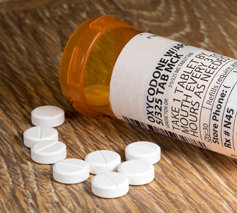Effects of Oxycodone Abuse

Oxycodone is a semi-synthetic opiate, formulated for the relief of moderate to severe pain. For many years, its addictiveness was played down by its manufacturers. At the same time, various medical associations began promoting the idea of better pain management which mean doctors were looking for stronger painkillers for their patients. It was several years before the truth about the addictiveness of this painkiller became apparent.
While some people found relief from serious pain that other painkillers could not touch, many other people were prescribed stronger pain medication than they needed and wound up addicted.
Oxycodone is found in many different formulations from different manufacturers. It is best known as OxyContin, but Percodan, Percocet, Roxicodone and Roxicets are also popular forms of oxycodone. In all, there are dozens of formulas that contain this drug.
As oxycodone is such a strong opiate, an addiction to this drug is akin to addiction to heroin. A person struggling with an addiction to oxycodone is driven by strong cravings and will encounter serious withdrawal symptoms if the drugs are discontinued.
A Body Builds a Tolerance to Opiates
A person who is taking opiates will develop a tolerance to the drug fairly quickly. Pain that was handled by a 10 milligram dose may soon require a larger dose to handle it, and then a higher one. A person may even be driven to acquire oxycodone illicitly if he (or she) can’t get enough from his regular doctor to each his pain. This is the slippery slope to addiction.
Of course, many people begin abusing oxycontin they got illicitly. They will follow the same path develop a tolerance and need more, and face severe withdrawal symptoms if they quit using the drug.
The real problem is the compelling nature of an opiate addiction. In order to keep the drugs coming, an addicted person will suffer a deterioration of moral values. He may turn to crimes he never would have committed before. Honesty, care for family, care for self or career or community will take a back seat to the ability to acquire more opiates.
If the person does decide to get clean or is unable to get the drugs he needs, he is going to hit severe withdrawal symptoms next. He will suffer from vomiting, nausea, severe muscle and bone pain, depression and intense cravings.
The effects of oxycodone go far beyond what this drug does to the abuser’s body or mind. One of the most significant effects of oxycodone abuse is addiction and destruction to one’s life.
Each year, nearly half a million people begin abusing oxycodone. Purdue Pharma has reformulated OxyContin in an effort to curb abuse, but that is hardly a solution. A person who is addicted will simply choose other formulas or switch to a different type of drug. Many of those who are in the grips of the heroin epidemic we are facing today can be traced back to oxycodone and other prescription opioid use before turning to heroin.
Short Term Effects of Oxycodone Use

In the shorter term, if you are looking for oxycodone effects, you are looking for typical opiate use effects. For example, a person using opiates will be sedated, sleepy lightheaded and euphoric.
Opiates customarily will cause constipation, which may drive the drug user to use laxatives. Opiate users may be itchy, and rub their faces and noses frequently. Pupils will be constricted.
All opiates suppress one’s breathing which is the usual cause of death when an overdose occurs. It is especially easy to die when abusing more than one drug that suppresses breathing, as when a person takes OxyContin and a benzodiazepine or alcohol.
Getting Rid of the Effects of Oxycodone
Oxycodone addiction is treated at many rehab facilities by prescribing substitute opiates like methadone, buprenorphine or Suboxone. These drugs maintain the person on a controlled dosage of a prescribed opiate drug. What is never addressed with this method of treatment is the root causes of addiction.
To recover, a person must find relief from the guilt, cravings and depression of addiction. He must learn to make drug-free decisions when those moments of challenge come along. And he must recover his personal qualities that were lost to addiction, like his moral sense, his perceptions and ability to communicate and honestly clearly to family and friends.
The eight-to-ten-week program offered at Narconon drug and alcohol rehabilitation centers provides these changes and many more. The program includes a thorough detox that returns clarity and life to a person, communications training that helps put a person back in control of self and emotions, and life skills training to help prepare a person for life after rehab.

The goal of the program is a drug-free individual. Narconon does not believe that an addict has to be an addict for life.
Find out how the Narconon program can help bring back someone you lost to OxyContin or oxycodone.
Also see Signs and Symptoms of Oxycodone.
Resources:
 ®
®